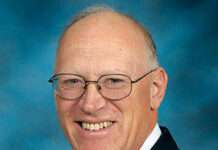Eight-part series focuses on business transition to help communities maintain local stores
MANHATTAN, Kan. – When a grocery store closes, the local community suffers. The Rural Grocery Initiative is addressing this problem with a free, online webinar series aimed at preventing such closures in the first place.
The eight-part series, “Keeping Groceries Alive: Successful Ownership Transitions for Rural Grocery Stores,” will kick off in late January to help grocers plan ahead so that their stores remain open, even after the owners retire or exit the industry.
The Rural Grocery Initiative is a program supported by K-State Research and Extension to provide resources and help sustain independently owned rural grocery stores.
David Procter, co-founder of the Rural Grocery Initiative and professor of communication studies at Kansas State University, said that without transition plans in place, grocery stores often abruptly close, leaving local communities with limited access to healthy food.
“Over a ten-year period, from 2008 to 2018, we tracked 54 rural grocery store closures,” Procter said. “We’ve learned that if a community can transition ownership and keep their store open during the process, the store is set up for success.”
Keeping Groceries Alive is presented in partnership with NetWork Kansas, the Kansas Rural Center, the Kansas Center for Business Transition, the Food Co-Op Initiative, and K-State Research and Extension. It is sponsored by the Ewing Marion Kauffman Foundation through the Heartland Challenge.
Upcoming webinars include:
• Jan. 28 – Grocery Business Transition Planning: An Overview
• Feb. 4 – Understanding Grocery Ownership Models
• Feb. 11 – Preparing for Business Transition
• Feb. 18 – Assessing Markets and Community Needs
• Feb. 25 – Planning your Business
• Mar. 4 – Funding the Transition
• Mar. 11 – Recruiting Store Managers
• Mar. 18 – Mastering Grocery Store Nuts and Bolts
Erica Blair, a program manager with the Rural Grocery Initiative, said making a business transition plan is in the best interest of grocers,
“Especially as grocers near retirement, developing an exit strategy is an important step toward securing financial stability,” she said. “Many grocers also want to see their businesses continue to flourish so that their legacies and communities live on.”
Rial Carver, a program manager with the Rural Grocery Initiative, says the webinar series will explore various community-supported grocery models. In many cases, according to Carver, some form of community ownership can be a viable option for maintaining a healthy grocery store.
“Communities across Kansas recognize that grocery stores are critical assets, both for the economy and quality of life. When communities are involved in the transition plan for a grocery store, innovative ideas arise,” she said. “We’ve seen several rural communities have success with public-private partnerships, cooperatives, and even school-based grocery stores.”
The webinar series is free and open to the public. Grocers, prospective grocers, and community stakeholders are encouraged to attend. To reserve a spot and receive the Zoom link, individuals can register online at www.ruralgrocery.org.
“We are pleased that the Kauffman Foundation is investing in rural communities and rural entrepreneurship,” Procter said, “and we are very pleased to be working with such a great group of partners on this important project.
FOR PRINT PUBLICATIONS: Links used in this article
Registration: Keeping Groceries Alive, https://www.ruralgrocery.org/events/webinars_and_workshops/webinars_workshops.html
Heartland Challenge, https://www.kauffman.org/our-grants/heartland-challenge-rfp
Rural Grocery Initiative, www.ruralgrocery.org
K State Research and Extension is a short name for the Kansas State University Agricultural Experiment Station and Cooperative Extension Service, a program designed to generate and distribute useful knowledge for the well being of Kansans. Supported by county, state, federal and private funds, the program has county extension offices, experiment fields, area extension offices and regional research centers statewide. Its headquarters is on the K State campus in Manhattan. For more information, visit www.ksre.ksu.edu. K-State Research and Extension is an equal opportunity provider and employer.
For more information:
Erica Blair
elblair@ksu.edu
Rial Carver
rtcarver@ksu.edu





